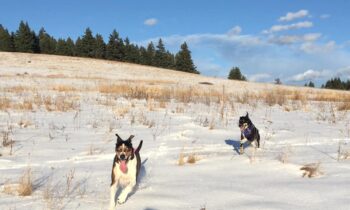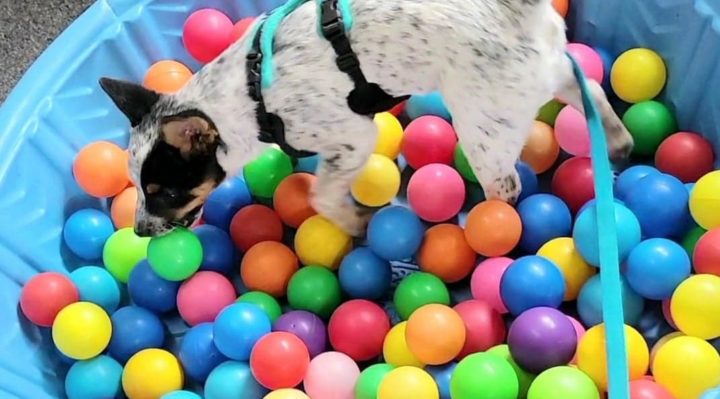
It’s been a wet spring where I live, with many loud rainstorms thundering overhead. Households that include sound-sensitive dogs have already been reminded that, with fireworks season coming soon, they may already be overdue for a visit with their veterinarian to discuss relief for noise phobias.
Fireworks, thunder, garbage trucks, maybe even the vacuum cleaner—if your dog is frightened, stressed, or frantic when the noise becomes too much, you may be in search of a solution. If you’ve added a puppy to your family recently, it’s the perfect time to prevent phobias about sound!
Carol Byrnes, a dog trainer with a young pup, explains how her family is working on prevention.
Puppies And Sound
Puppies and adolescent dogs go through normal developmental fearful periods that seem to align with growth spurts. Our five-month-old pup Arbee is going through one right now. She is easily startled and has “found her voice,” bursting into barking at unfamiliar noises. We are addressing the emotion, not the noise. The alarm barking will subside when she is no longer startled. She’s habituated to the sound of airplanes going over. They were pretty scary. Now they are just background noise.
Traumatic experiences during these normal fear periods can result in lasting reactions. A puppy’s first thunderstorm and fireworks experiences can affect their reaction to every future storm and 4th of July. We are preparing now and using plenty of management to keep bad experiences at bay, while continuing to expand Arbee’s resilience around new sights and sounds.
We are counterconditioning (creating new associations) throughout the day. Novel noises are followed by a fun scatter of yummy treats for her to sniff and find. We are also creating controlled positive sound associations. We have a “ball crawl” for her to snuffle treats from under the rumbling, rolling plastic balls in a plastic wading pool. We pop bubble wrap to announce meal time and, when she comes running to the sound, she gets to tug, shake and destroy the bubble wrap before we present her meal. (This is a supervised game, of course.)
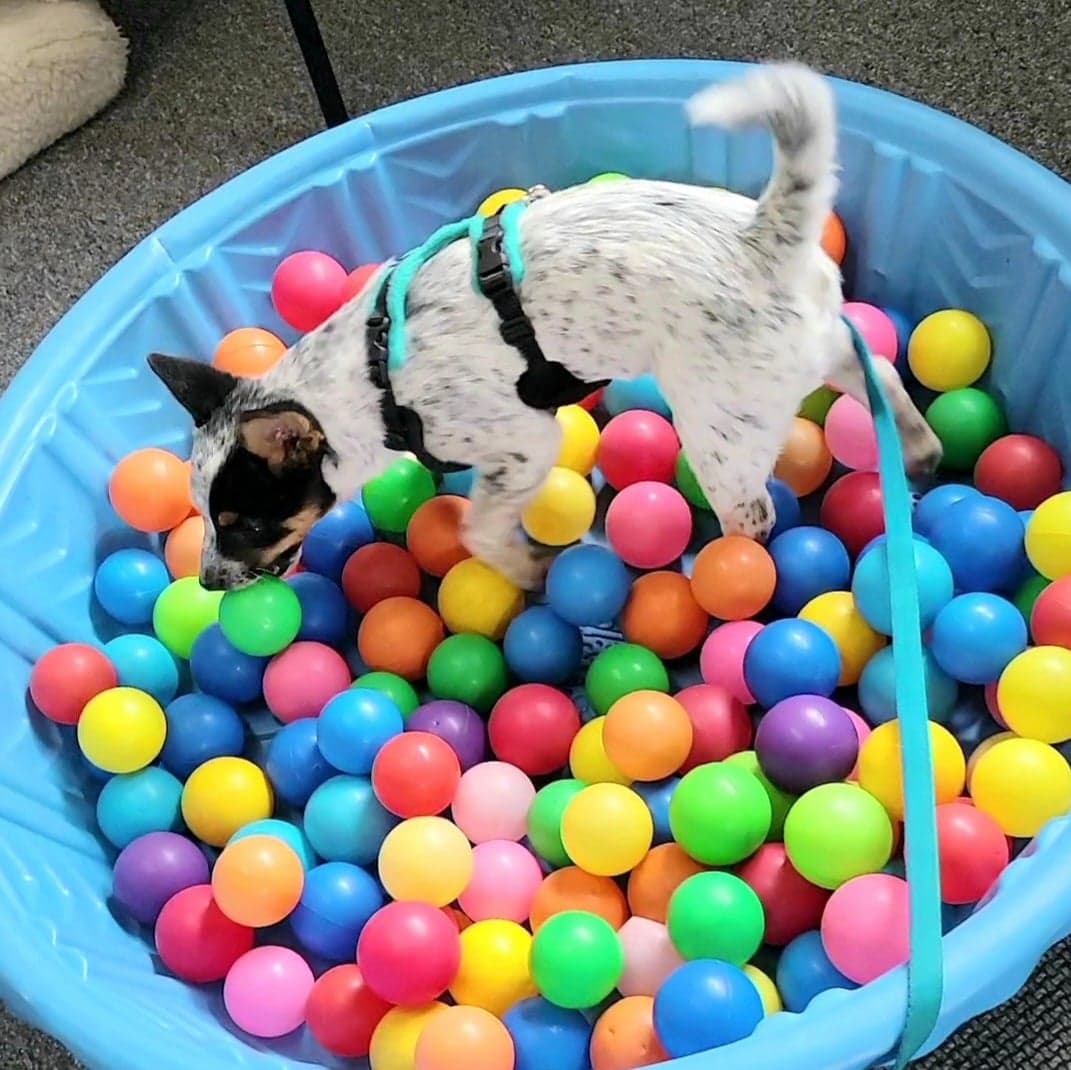
Photo by Carol Byrnes
Startle alerts are followed by an explanation: “It’s a dog on the TV!” Or “Motorcycle! Let’s go see!” and we go look out the window, showing her with our tone and actions that it’s cool and nothing to be afraid of. Remember, your response matters. You want to sound confident and pleasant. Cooing and coddling, “It’s okay” makes you sound afraid, too. If you become angry every time your pup barks because he’s afraid, you are compounding the already negative experience. Now garbage trucks aren’t just scary, they also predict that your favorite person is going to yell at you, or worse—not good.
When creating associations, the order is essential. Conditioned emotional responses are the result of a predictable pattern: “Good things happen after X” or “Bad things happen after X.” The worrisome sound predicts the positive event (food, game) and not the other way around. If you see lightning flash and try to feed your dog to distract them before the boom, the food may soon predict the thunder and the presentation of food might predict bad things are coming. You might accidentally condition a fear of food. The rumble must predict the food.
Garbage trucks are tough because they only happen once a week, but they are predictable! During this sensitive period in her life, I carry cubed cooked chicken on garbage day. Every time she alerts to the sound of a truck, I cheer and chicken rolls across the floor. She’s starting to notice the sound and turn to me with happy anticipation. A positive association is forming. Big trucks are beginning to predict good things. Instead of spooking and running away, she’ll come running to me wagging. The result of our work is showing. When she gets scared, she comes and gets me. Sort of the Lassie version of “Come quick! There’s a thing!” And it’s positive for me, too. Instead of yelling “Shut up!” I get to say, “What is it? Show me!”
Plans are in place for the 4th. We have melatonin and Composure calming supplements ready and will start them in the days prior. On the 4th, I’ll have the air conditioner and fans humming for white noise, I’ll turn up the TV, and close all the windows. We’ll get outside for lots of exercise and we’ll time meals and potty trips so we don’t have to go out after the chaos begins. The part we can’t control is that the fireworks begin to pop and boom in our neighborhoods weeks before the 4th and continue for days after. I wish people would realize how traumatic their “fun” is to pets, wildlife, and our veterans. Not to mention the fire danger.
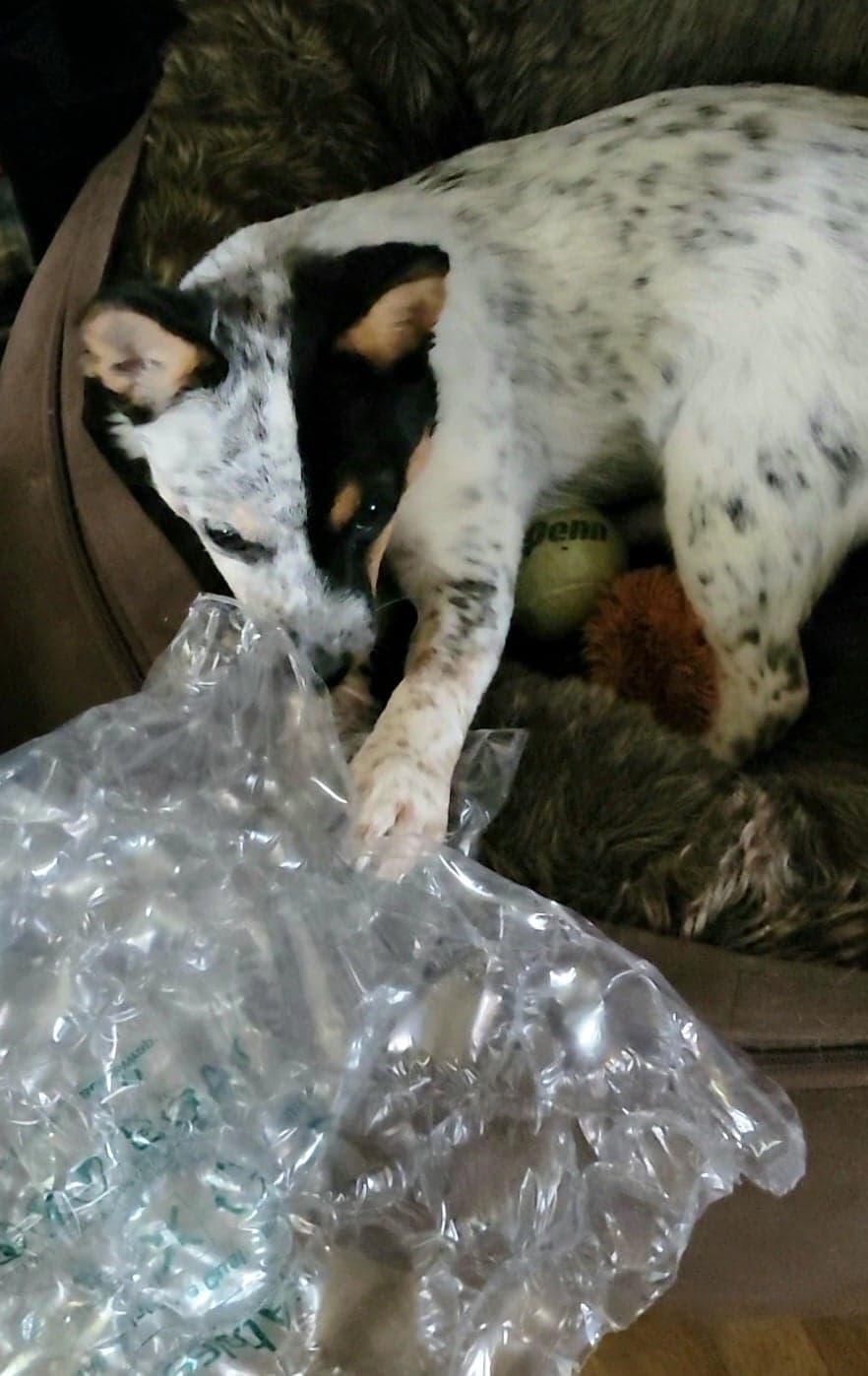
Photo by Carol Byrnes
If your dog is already frightened or frazzled by fireworks, thunder, garbage trucks, and other loud noises, desensitization protocols may be difficult to do, as trainer Eileen Anderson tells us, and it’s important that you don’t scare your dog further. Eileen recommends ad hoc counterconditioning.
Dogs And Sound
Eileen Anderson (Arkansas) Desensitization protocols are hard to do if a dog is already afraid of fireworks, because we can’t truly replicate the sounds of all fireworks through speakers because of the limitations of our hardware and that of many recordings, which are compressed and optimized for the human ear. But it can be a good way to start and get some practice, as long as you don’t scare your dog further. There is research, though, that indicates that some dogs do not make a connection between sounds coming out of speakers and actual environmental sounds like fireworks and thunder. That’s why I stick with ad hoc counter-conditioning; sound masking with white or brown noise; loud music that the dog is already accustomed to; or even kitchen appliances. I also create as relaxing an environment as possible. I have had success with ad hoc counter-conditioning—counter-conditioning without a desensitization component; just dropping wonderful food when there is anything resembling a bang or boom or, frankly, any sudden, startling noise.
Denise Nuttall (United Kingdom) [I use] a mixture of management and counter-conditioning.
It’s much more difficult with storms because the dog can back-chain to atmospheric changes and start to show anxiety before the storm arrives. So try counter-conditioning with a treat party combined with provision of a safe denning space in a place that can be made as quiet as possible—a box padded with a duvet so the dog can burrow in and the sound will be quieter. I’ve had a lot of success with desensitization to some sounds, like fireworks. I use Bluetooth speakers so the sound comes from different places, and pair this at low volume with scatter feeding, hunting games, or other pleasant activities. During real-life sudden sounds, have a treat party. For known planned big fireworks events, I try avoidance—can the dog stay with family away from the event? Or medication in advance using a benzodiazepine group medicine like alprazolam. This would be prescribed by the vet and can be useful to keep them calm, but can also reduce memory formation if they do get scared due to the amnesic properties of these meds. Some dogs can have paradoxical response to these meds, so test doses should be trialled in advance. This is recommended in the BSAVA (British Small Animal Veterinary Association) manual of canine and feline behavioral medicine. Some vets use Sileo, but that can be tricky as it needs to be applied to the gums. This is licensed for noise phobias in the United Kingdom.
Julie Ellingson (California) Any loud and unexpected noise is greeted with a “Yay!” and “Oh boy, let’s see what happened!” Treats and small celebrations sometimes occur. I’m lucky in that my dogs don’t worry too much. My chihuahua cross needs a little help through chemistry during the week of Independence Day, but even she will run for the treat jar for random loud noises. My mother’s dogs have a Trazadone prescription for Independence Day time. She has Vari-Kennels covered with a blanket out for them to hide in if they need to. She has discovered that her poodle is happiest on her lap and having his hair combed during fireworks time. Hey, whatever works, right?
Timothy Page (Oregon) My partner is against using calming pills. Lalo is now 11, almost 12. Over the years he has gotten less distressed from the sounds of fireworks and thunderclaps. I ordered a Thundershirt. It works, but he looks like he’s not particularly happy wearing it. I found lots of tight hugs work almost as well as the shirt, but that means holding him constantly for long periods of time. In the last two years, he hasn’t needed the Thundershirt or the tight hugs. A little gentle reassuring seems to get him into a calm state.
Jamie Robinson (Florida) We play before storms (and Florida has a storm almost every day with thunder in the summer). Then everyone sleeps or rests from the play and ignores the storm.
Shelly Keel (Idaho) I am very fortunate that my Journey and my Dakota before her did not have storm/sound phobias. I started strategically exposing both of them very early in life to gunshots at gun clubs/hunting and similar sounds using TV and phone as I was able. Any new popping or banging sounds are met with “Yay! THUNDER COOKIES!” in an excited voice . . . as yummy treats are strewn around. We play this game as an ongoing part of life just to help keep the R+ response strong. This same method has been shared with many clients over the years with good success.
For dogs with sound phobias already built in, I have recommended a vet visit and inquiry about Sileo meds and setting up as soundproof a situation as possible in the interior of homes to protect against panic attacks. If meds and sound muffling help the dog to stay below threshold then begin careful conditioning with thunder cookies.
Kathleen Huggins (Washington) We’re on dogs 6 and 7. Neither one reacts to either. Thank goodness. Funny thing. Dog number 5, our only large dog, was afraid of both when we also had number 3 and 4, who were both afraid of both. When 3 died, we got number 6 who is not afraid. Then number 4 died, and the big girl, number 5, stopped being afraid, too. I guess having a brave family member helps?
Karla Smele (United Kingdom) Never had a dog bothered in 25 years, until two years ago, with my Rhodesian Ridgeback x Weimaraner, now 10 years old. I’ve heard that noise phobias can come on later in life for dogs. It’s been awful. I try to stay calm myself. Valium has worked. I don’t like giving drugs but nothing else that’s “natural” that I’ve been advised to try has worked, and I can’t stand seeing him so distressed.
Toni Vignogna (California) I conditioned my dogs by throwing a squeaky toy when fireworks start. We’d just play through most of it and they didn’t care about the loud noises. It also helps if you don’t act startled. If I’m calm or happy (I love thunderstorms!), they react in kind.
Teresa Tuttle (Texas) I have a noise-phobic rescue border collie. I got her from the shelter when she was eight months old (best guess). For nine years, I’ve worked to desensitize her, but I haven’t had much luck. Many years ago I added a Thundershirt with good results, but not great. I started her on melatonin four weeks ago. We had a storm two weeks after I started the melatonin and for the first time in nine years, my dog was outside with me during a thunderstorm, on the porch by choice! She was a little stressed, but nothing like she had been. I still use the Thundershirt when it storms. Melatonin has helped her so much! I use K9 Choice 3 mg twice a day with excellent results. Her startle bark has decreased 90%, but she’s still a happy active dog.
Sara Maynard (Trinidad and Tobago) I had success with one of my dogs using a Thundershirt; others have had chewables. But for some, my vet has prescribed Children’s Gravol (tablet) and acepromazine or Valium. In one case, nothing worked except for a dark small room and heavy sedation. On the whole now, most of my dogs are fine one they are with me and inside.
Carol Byrnes (Washington) I notice someone mentioned acepromazine. I can’t remember who did the study that says NEVER use ‘ace’ for sound phobias. It’s essentially immobilizing the animal, also referred to as a “chemical straitjacket.” As a result, a noise-phobic pet may actually become more fearful of noises while under the influence of acepromazine.
Christine Hale Vertucci (Illinois) I’m fortunate that our current two dogs aren’t bothered in the least by storms or fireworks, but I’ve experienced serious storm and noise phobia with a previous dog (and cat). For her, what worked was a combo of melatonin and a Thundershirt. We also kept the windows closed and played music or the TV loudly to try and block off the noise. We could not walk at any time when there would be fireworks; otherwise, evening walks would be out for a full week afterwards.
Dave Koch (Washington) Basement bedroom that she quietly retires to. Does that for windstorms, too.
Cathy Collins (Michigan) I have struggled with this for a while with one of my dogs. I have used hemp oil with minimal success. Trazadone works well but I’m still looking for a better alternative.
Teri Stripes (Washington) Loud music and apple treats.
Marcy Rauch (New York) Calming treats and brown noise from a noise machine or . . . https://youtu.be/hXetO_bYcMo.
Rebecca King (Ohio) Clonidine.
Carrie-Anne Selwyn (United Kingdom) Sileo gel was a huge help with our girl.
Trish Ryan (South Carolina) Thundershirt or tee shirt for our gal, along with a food/treat dispensing toy—Kong Wobble, Buster Cube, Tricky Treat ball, something she can move around while getting goodies helps tremendously. Oh, and her king-sized pillow.
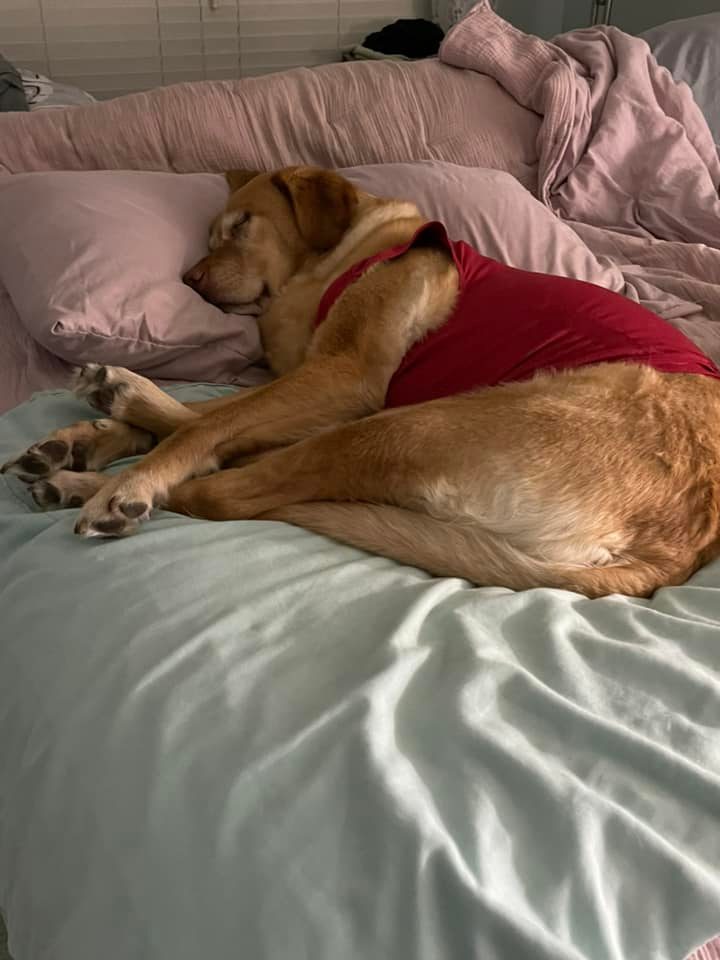
Photo by Trish Ryan
Dawn Elberson Goehring (Hawaii) We have a ton of fireworks overhead here; they shake the house. Sileo has worked the best. I also pair it with Thundershirts, Licki-mats, and other food-stuffed toys. Windows are closed and classical music on. I condition the classical music and food-stuffed toys for a couple of weeks before the 4th. For the weeks leading up, I also take advantage of the random booms by having treat parties whenever there is a loud noise or random firework. I keep bags of cut-up hot dogs and chicken in the fridge and ready to go. On the 4th there are also treat parties whenever one goes off.
Trillium Schlosser (Oregon) My lab was afraid of loud noises. I gave her melatonin and Benadryl and one of my dirty shirts to wear (it worked better than a Thundershirt). Then we moved into the flight path of airplanes and it took her about a week to get used to loud noises. She would still get nervous at lightning/thunder and when the Coast Guard were practicing low and fast, but melatonin and a dirty shirt would take the edge off. P.S. I swear I do laundry.
Debby McMullen (Pennsylvania) My dog is on Xanax for the 4th now. The 2020 fireworks ruined lesser options for him, though I still use them as part of the protocol. Composure, a double dose, at breakfast and dinner; Alderson Essences Very Scary Things every 2–3 hours; Xanax as the afternoon wanes; enrichment walk earlier; AC on blast; TV on Spa Music Blast; possibly Aromadog Chill Out if I have it then. But the Xanax is the real winner that day. However he won’t go out for the last potty without Very Scary Things in his system within ten minutes of my asking, even with Xanax.
Rebecca M. Sanchez (Washington) For fireworks (and other noise-phobia–related) give CrittEar in-ear dog earplugs a try. They are a natural solution, dogs aren’t groggy, and they help with desensitization. We used them when we had our house remodel, and they definitely helped keep our noise-reactive pup much more calm.
Eileen Anderson Just a heads-up: earplugs can be helpful, but they don’t block low-frequency sounds like thunder or the biggest booms of fireworks. Those very large sound waves come straight through our skulls and our dogs’ skulls, which conduct sound very well. The ear canals are superfluous in that case. But earplugs can dampen moderate to high frequencies, which will likely help some dogs.
Dawn Heaton (United Kingdom) Valerian compound, a raw meaty bone, and Taiko Drums playing from YouTube. In the run-up to bonfire week (U.K.—it used to be one night, but seems to last well over a week these days), I add a few drops of valerian in their evening meals for a few days before the main weekend and then max doses over the weekend! If we get an unexpected storm or fireworks going off then the drums go on, while I get a long-lasting chew or bone laced with valerian ready! We also do noise conditioning, playing sounds and ignoring, etc.! Treat scatters while loud noises are going on, etc. Two of my seven are reduced to drooling quivering wrecks if it’s a continued barrage of fireworks—it’s heart-breaking.
Jessica Theisen de Gonzalez (New York) My dog went from curious-and-okay to really traumatized because of the excesses of the pandemic. She had a baseline anxiety which was treated with many modalities (diet, supplements, desensitization work, various medications) and that baseline shot up during the pandemic when my neighborhood had months of explosive excesses. The 4th was 12 solid hours. Last year I experimented with an overnight away from home but it wasn’t far enough away, nor long enough, so she was anxious with the relocation and noise. This year, the plan is multiple nights at a hotel well outside of New York City where we live. It will provide her enough time to settle in. That is the only viable solution I can foresee that will work for her—just removing the stimulus that pounds her nerves.
Kate LaSala Ctc Csat (Connecticut) Meds, meds, meds! Noise aversion can worsen with time. Meds can help a lot. I’m always encouraging owners to speak with their vets about meds far in advance of needing them, so meds can be trialled during non-emergent times and so the correct dose can be figured out. For dogs with true noise phobias, home remedies are not enough and dogs will sensitize over time. If we can prevent their suffering and fear, why wouldn’t we? 100% meds. Training can help, if you have enough time, but often needs to be combined with meds to be effective. We cannot discount that noise phobias are often genetic also, so meds really help those cases.
What have you found that best helps your dog with sound phobias?
You don’t have a solution yet?
It’s definitely time to make an appointment with your veterinarian!

